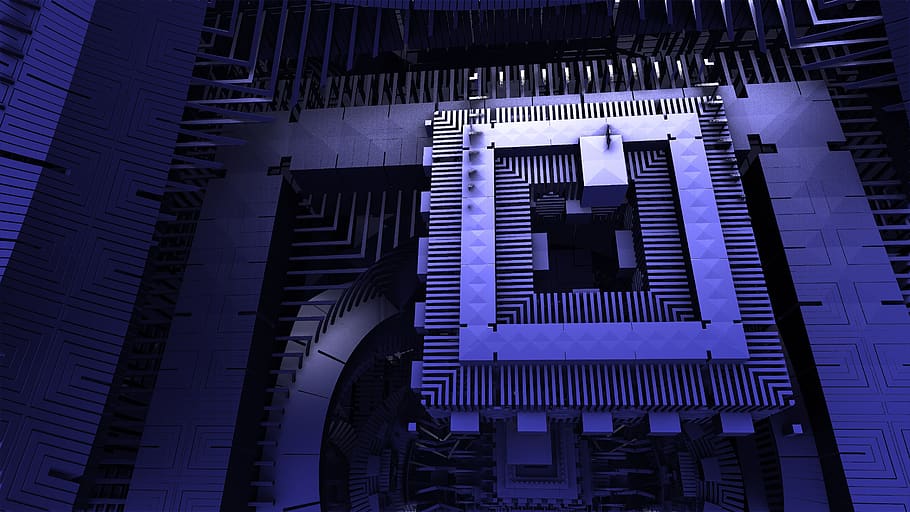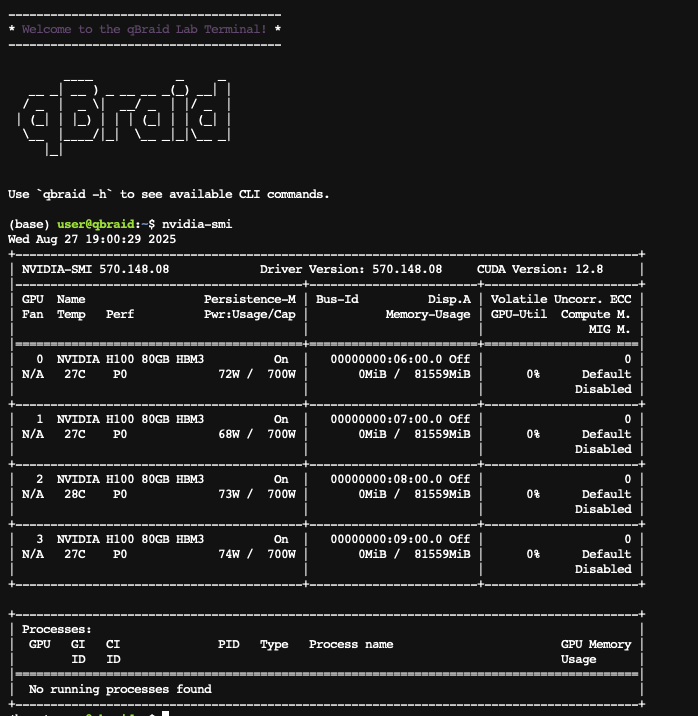Press Releases
10
Min read
qBraid and NVIDIA CUDA-Q are removing the two biggest blockers to AI4Quantum research

Contents:
Posted: October 27, 2022 Original article
At its annual Innovation conference in San Jose, California, Intel Corporation announced that an Ohio State University team will receive a grant to develop a curriculum focused on quantum science and engineering.
The funding is part of Intel’s academic program that will create a community of developers to explore programming applications for quantum computing. Universities will develop quantum course curricula to proliferate the use of the Intel® Quantum Software Developer Kit (SDK), a full-stack software development kit optimized for executing hybrid algorithms. In addition to Ohio State, Pennsylvania State University, the University of Pennsylvania, Deggendorf Institute of Technology and Keio University also received grants.
Led by Electrical and Computer Engineering Professor Ron Reano, the Ohio State faculty working group includes Computer Science and Engineering Assistant Professor Syedah Zahra Atiq, Physics Professor Mohit Randeria, and Physics Professor Nandini Trivedi. To enable broad dissemination, they will partner with the National Science Foundation-funded QuSTEAM Initiative, a multi-institution effort led by Ohio State to develop a diverse and effective workforce by creating more equitable pathways to quantum science education. The faculty also will partner with qBraid, a cloud-based platform for learning about quantum information and programming on quantum computers.
Quantum computing promises to dramatically speed up complex problem-solving and has the potential to enable significant breakthroughs in materials, chemicals and drug design, financial and climate modeling, and cryptography. Advances in quantum bits, or qubits, are one step toward achieving quantum practicality, but significant breakthroughs are needed across the full hardware and software stack to realize its full potential.

The Ohio State team will leverage the Intel Quantum SDK to enable its students to program quantum computing algorithms with a high-performance Intel Quantum Simulator qubit target backend. According to Reano, the curriculum will focus on quantum computing concepts targeting undergraduate and graduate students from physics, computer science, computational science and electrical and computer engineering. It will be piloted during the 2023 spring semester.
After piloting initial course modules, the working group will partner with relevant departments to insert the modules into other courses offered to students. Beyond the period of this award, the piloted modules will be incorporated into the QuSTEAM network and distributed to more than 25 colleges and universities within two to three years and up to 300 by 2027.
“The modules will be injected into classrooms with both undergraduate and graduate students who will participate in coursework covering a variety of topics, from integrated optics and
photonics to quantum mechanics,” said Reano. “We see this work with the Intel Quantum SDK as an important step in creating a community of developers who can program quantum computers as we strive to bring this nascent technology to its full potential.”
Earlier this year, Ohio State announced its Center for Quantum Information Science and Engineering (CQISE), which is creating synergy among the university’s current activity and pushing the entire field forward. Center co-directors are Reano and Ezekiel Johnston-Halperin, professor in the College of Arts and Sciences Department of Physics.
“We will bring together key examples from all the modules and present them at a student-event hosted by CQISE,” said Reano. “The event will expose the SDK and the use of real qubits to the larger student body, highlighting what’s possible with this powerful technology.”

Press Releases
10
Min read
qBraid and NVIDIA CUDA-Q are removing the two biggest blockers to AI4Quantum research
.png)
Product
5
Min read
We are pleased to have presented qBraid’s Platform-Agnostic Open-Source Tools at the Quantum Computing Devroom in FOSDEM 2025.

Press Releases
8
Min read
Our first cohort of the qBraid Alliance, a partnership with student organizations at leading universities around the country.

Collaborations
3 minutes
Min read
qBraid has been selected by IBM to host their annual Qiskit Global Summer School for the second year in a row.

Collaborations
5
Min read
As an early adopter of the NVIDIA GH200 Grace Hopper Superchip systems, qBraid provides unparalleled access to today’s most advanced computing technologies.

Collaborations
1
Min read
Explore the advantages of cloud-based quantum computing and how it is revolutionizing research and development across various industries

Collaborations
1
Min read
Discover how quantum computing is revolutionizing enterprises, from enhancing cybersecurity with quantum encryption to optimizing complex logistics and supply chain operations.

Collaborations
5
Min read
qBraid’s quantum computing platform adds access to 256 qubit neutral atom quantum computer, Aquila by QuEra.

Collaborations
5
Min read
qBraid and Quantum Algorithms Institute partner to accelerate the pace of quantum computing in British Columbia and beyond.

Collaborations
4
Min read
The qBraid platform will allow users to play with Pulser in a matter of a few minutes.

Hackathons
5
Min read
As part of QHack, qBraid is providing the best quantum developer notebook environment experience for challengers.

Hackathons
10
Min read
From October 21st to November 5th of 2022, qBraid hosted HAQS, one of the most popular quantum computing events of the year, where participants from around the world worked on solving a total of five quantum computing challenges during the two weeks of the event.

Hackathons
5
Min read
At this year's QCHack, participants attended a week filled with amazing talks, 1:1 sessions with academic and industry mentors, and a 24 hour hackathon hosted by Stanford, Yale and Berkeley.
-min.jpeg)
Hackathons
4
Min read
The potential of the field of quantum computing is so huge that everyone in the field cannot wait for all the promises that the field holds to become a reality.

Research
5
Min read
IEEE has awarded qBraid and its collaborators 1st place for the Best Paper Award in the Quantum Algorithm Track.

Research
1
Min read
qBraid's team used hybrid classical-quantum algorithms to determine the best flight path

Research
1
Min read
Learn how classical sampling methods, such as Markov Chain Monte Carlo, can estimate truncation errors in simulating bosons on quantum computers, aiding resource assessment and result validation for quantum simulations, including applications in two-dimensional lattice scalar field theory.

Press Releases
2
Min read
qBraid wins NSF POSE grant to build open source ecosystem

Press Releases
10
Min read
qBraid and NVIDIA CUDA-Q are removing the two biggest blockers to AI4Quantum research

Press Releases
8
Min read
Our first cohort of the qBraid Alliance, a partnership with student organizations at leading universities around the country.

Press Releases
5
Min read
Coming from IBM Quantum Lab? Learn how to start using qBraid Lab

Press Releases
10
Min read
The Bloch develops quantum technology solutions for society’s most pressing problems by accelerating industry adoption to drive research commercialization, catapulting US leadership in quantum information science and technology.

Press Releases
5
Min read
Our newest podcast series

Press Releases
5
Min read
qBraid will lead a team of researchers from MIT, UChicago, Argonne National Laboratory, and QuEra to develop quantum computing solutions for studying the interaction of metals and intrinsically disordered proteins.

Press Releases
Min read
OSU uses qBraid for accessing Intel Quantum SDK

Press Releases
5
Min read
qBraid provides agnostic connections to quantum computers and simulators thanks to Amazon Braket

Press Releases
10
Min read
Duality Quantum Accelerator Accepts Six Startups into Inaugural Cohort

Press Releases
1
Min read
Take the QuBes (Quantum Beginners) course to learn quantum computing.

Press Releases
5
Min read
qBraid aims to increase accessibility to, and interoperability amongst, quantum computing resources.

Product
3 minutes
Min read
Supercharge your quantum workflows with GPUs on qBraid
.png)
Product
5
Min read
We are pleased to have presented qBraid’s Platform-Agnostic Open-Source Tools at the Quantum Computing Devroom in FOSDEM 2025.

Product
5
Min read
Accelerating hybrid workflows using Pennylane's embedded simulators with NVIDIA GPUs on qBraid Lab.

Product
5
Min read
Here are 3 ways to install python packages on qBraid

Product
2
Min read
How to install Cirq v1.2.0 environment on qBraid Lab

Product
1
Min read
Let qBraid help you take your first step into the quantum world!

Product
1
Min read
Intel® Quantum SDK is generally available on qBraid Lab for Free with no installation necessary

Product
1
Min read
Dive into the intricate interplay of the Bernoulli line and the Bloch sphere, revealing profound geometric insights into quantum state dynamics.